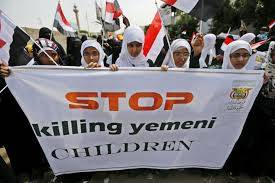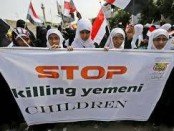



Various Yemeni political parties and alliances, meeting in Switzerland, had agreed on a seven-day cessation of hostilities in mid-December. Nonetheless, there has been no easing of tensions on the ground or of air strikes carried out by Saudi Arabia and supported by the Gulf Cooperation Council. The deadly bombardments utilize Pentagon intelligence and refueling technology.
Meanwhile, ground forces composed of the same Saudi-led alliance have launched an offensive near the capital city of Sanaa. Ansarullah (Houthi) forces have controlled the capital of the impoverished Middle Eastern state since September 2014.
The Ansarullah movement has its origins among the Shiite population in the north of Yemen, who have been waging a protracted struggle against neighboring Saudi Arabia for many years.
Opponents of the Houthis say they are backed financially, politically and militarily by the Islamic Republic of Iran, thereby seeking to frame the escalating conflict as a proxy war between Riyadh and Tehran.
Military units under the banner of ousted President Abedrabbo Mansour Hadi, who are supported by the U.S.-backed Saudi-led coalition, have been fighting in Ansarullah-controlled areas in Sanaa province, after claiming significant gains in Marib province, just east of the capital. They also attacked a military base northeast of the capital.
An estimated 68 people died on Dec. 19 in clashes between pro-Saudi fighters and Ansarullah units in northern Yemen, local residents reported, prompting additional warnings by the United Nations of a total breakdown in the Swiss negotiations. The casualties included 28 fighters allied with Hadi and the Saudi-GCC coalition.
Sources in the northern region reported that the Ansarullah units lost 40 people in heavy battles near the northwestern town of Haradh, which was attacked earlier in the week by Hadi loyalists. Approximately 50 Ansarullah and 40 Saudi-backed fighters were wounded in the clashes.
Fighting intensified during the early morning hours on Dec. 19, when Saudi-GCC allied forces sought to move towards the Red Sea port of Midi. The Hadi and Saudi-allied forces, trained in nearby Saudi Arabia, had invaded northern Yemen from the monarchy on Dec. 17, attacking Haradh.
Ansarullah forces are fighting alongside Yemeni soldiers who remain loyal to former President Ali Abdullah Saleh, who left office after demonstrations in 2011. The escalation of conflict in Yemen since late March has resulted in the deaths of 7,500 people, the wounding and injuring of 14,000 more and the displacement of millions. Fighting has spilled over into eastern Saudi Arabia, where the population is Shiite.
Washington’s central role in Yemen war
The Saudi-GCC coalition, which uses Pentagon-provided warplanes, bombs and intelligence resources, is obviously escalating its attacks on several regions of the country, accusing the Ansarullah of violations of the ceasefire. However, the forces allied with the Houthis have no air power and are fighting on the ground against well-armed units of the Saudi-backed militias, who are backed by special forces and troops from Riyadh, the United Arab Emirates, Egypt and Sudan.
In addition to these foreign forces involved in efforts to drive back the Ansarullah from the areas they have seized over the last 15 months, the UAE has recruited and deployed troops from the U.S.-backed South American state of Colombia. This government is the third-largest recipient of Washington’s direct aid, after Israel and Egypt.
The Nov. 25 New York Times reported, “The United Arab Emirates has secretly dispatched hundreds of Colombian mercenaries to Yemen to fight in that country’s raging conflict, adding a volatile new element in a complex proxy war that has drawn in the United States and Iran.”
The French news agency AFP reported on Dec. 19 that only “about 300 of the 3,000 Colombians recruited so far by the UAE ‘decided voluntarily’ to fight as full-fledged mercenaries in southern Yemen.” Emirati officials “initially decided to deploy 800 Colombians to Yemen, but had to rethink their plans after recruits complained that fighting in Yemen was not included in their contracts.”
This decision to contract Colombian troops was made in part as a result of the killing of 30 Emirati troops during fighting in September in the south of Yemen. The arrangement for the deployment of the Colombians was carried out by Blackwater, the so-called military services firm that has trained special forces in the UAE. AFP said its source was former Colombian army officers, at least one of whom was later employed by Blackwater.
Blackwater military contractors played a significant role during the initial U.S. occupation of Iraq in 2003-2004, when some of their employees were accused of committing atrocities.
The humanitarian crisis inside Yemen has reached catastrophic proportions, as the Saudi-GCC coalition has prevented food supplies, medicines and water from reaching affected areas in the conflict. Hospitals, schools and residential districts have not been spared in the Saudi bombing, explaining the high rate of civilian casualties.
Ports on the Yemeni coast have been bombed repeatedly since March. Yemenis have taken refuge in Djibouti in the Horn of Africa, which also hosts a military base of the U.S. Africa Command (Africom) at Camp Lemonier.
It was reported that a decline in fighting on the ground in some areas provided hope for the immediate future, but many are concerned that it could erupt again soon with the same ferocity. The Saudi-GCC coalition has been bombing Yemen since late March and also providing arms and coordination for the ground war designed to force the Ansarullah and its allies out of southern and central Yemen.
A prisoner swap was halted in the Bayda province after local leaders blocked the transfer, saying their fighters were not included in the operations.
London’s supply of arms to Saudi Arabia has been criticized by leading British newspapers, as well as Amnesty International, for fueling the conflict that has killed thousands. British newspapers such as the Independent and the Guardian suggest that the supply of arms from London is creating an even more deadly situation on the ground in Yemen.
Talks are scheduled to continue in Switzerland. it remains to be seen what real impact the discussions will have, considering the escalation of fighting in the central and northern regions of the country.
Yemen is yet another example of the disastrous imperialist war policy directed towards numerous West Asian and North African states. At present, 60 million people have been displaced from their homes as a direct result of these Pentagon-fueled wars. This crisis of human displacement is the largest in history, even exceeding figures from the conclusion of World War II.
May 19, 2025, will mark the 135th birthday of the great Vietnamese leader Ho Chi…
Philadelphia Honoring the 11 people murdered by the state when they dropped a bomb on…
The centennial of the birth of Malcolm X, also known as El-Hajj Malik El-Shabazz, is…
On May 11, which was Mother’s Day this year in the U.S. and several other…
Philadelphia On Mother’s Day 2025, May 11, Families for Ceasefire Philly and over 20 local…
North Philly Peace Park gathering After a federal court hearing on an anti-immigration bill early…